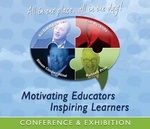 Here’s a photo I took recently on the London Underground. There are periodic announcements, static noticeboards, and electronic delays constantly assuring us that we are experiencing a good service. I presume it is intended to introduce a feel-good element into an otherwise mundane existence.
Here’s a photo I took recently on the London Underground. There are periodic announcements, static noticeboards, and electronic delays constantly assuring us that we are experiencing a good service. I presume it is intended to introduce a feel-good element into an otherwise mundane existence.
O is for … opportunity cost
 Opportunity Cost is a key concept in Economics, and is tremendously useful outside that discipline. It is especially pertinent in the sphere of education technology. It is defined as: the next best alternative foregone.
Opportunity Cost is a key concept in Economics, and is tremendously useful outside that discipline. It is especially pertinent in the sphere of education technology. It is defined as: the next best alternative foregone.
Unlike the more familiar idea of financial cost, opportunity cost can change its value according to both contextual and subjective factors.<
Maintaining Standards
 So, you're responsible for the use of educational technology in the school, but its use and principles are taught across the curriculum rather than as a discrete subject. In other words, by non-specialists in all likelihood. How can you maintain high standards in ICT and the use of educational technology in such a situation?
So, you're responsible for the use of educational technology in the school, but its use and principles are taught across the curriculum rather than as a discrete subject. In other words, by non-specialists in all likelihood. How can you maintain high standards in ICT and the use of educational technology in such a situation?
In this article I look at 14 suggestions.
Getting the most from the BETT show
Eleven years ago I wrote an 8-point guide to BETT, in my newsletter, and have reproduced it below. I think the points still stack up, especially the one about having a good breakfast! I hope you enjoy reading this blast from the past (9th January 2001 to be exact). And when you have done so, why not download the up-to-date bumper edition – 125 stupendous tips, and completely free? The URL is at the end of the article.
At the time this was written, the web was still relatively new to a lot of teachers, and Google had been on the scene for about three years. At that time it was still only a search engine. The newsletter was sent in text format from my own email address using my personal email client, which at that time was Eudora. Ah, such days of innocence!
Products, trends and advice from BETT 2012
 In a couple of hours’ time I will be distributing the latest version of Getting the Best out if BETT, which includes the views of over 30 people who attended last year’s BETT. Here’s a Wordle of what products they thought worth pursuing, the trends they spotted, and the advice they offer to schools in these straitened times.
In a couple of hours’ time I will be distributing the latest version of Getting the Best out if BETT, which includes the views of over 30 people who attended last year’s BETT. Here’s a Wordle of what products they thought worth pursuing, the trends they spotted, and the advice they offer to schools in these straitened times.
BYOD Case Study: Tideway School
 In late 2011 the issue of mobile technologies and their use in school began to be discussed at a senior leadership team level in Tideway School. However, the school resisted the temptation to race headlong into improving the infrastructure in order to allow students to use their own devices to access lesson and learning resources, because the benefits of doing so in terms of either pedagogy or learning gains were not self-evident.
In late 2011 the issue of mobile technologies and their use in school began to be discussed at a senior leadership team level in Tideway School. However, the school resisted the temptation to race headlong into improving the infrastructure in order to allow students to use their own devices to access lesson and learning resources, because the benefits of doing so in terms of either pedagogy or learning gains were not self-evident.
E is for… Equality
 Equality is a big issue in education, especially in connection with technology. For example, we are used to hearing phrases like “the digital divide”. But what does “equality” mean in this context – or, more pertinent perhaps, what should it mean?
Equality is a big issue in education, especially in connection with technology. For example, we are used to hearing phrases like “the digital divide”. But what does “equality” mean in this context – or, more pertinent perhaps, what should it mean?
5 ways to establish credibility on your blog
 I don’t know what it’s like living in other countries, but here in England we are fortunate indeed. If I want to have a discussion on any subject at all, I can simply walk into the pub nearest to where I happen to be at the time, where I am virtually certain to discover a self-styled “expert” declaiming about the economy, or what’s wrong with kids today, or how to solve the financial crisis, or whether or not kids should be taught how to programme, or how the entire education system should be put right.
I don’t know what it’s like living in other countries, but here in England we are fortunate indeed. If I want to have a discussion on any subject at all, I can simply walk into the pub nearest to where I happen to be at the time, where I am virtually certain to discover a self-styled “expert” declaiming about the economy, or what’s wrong with kids today, or how to solve the financial crisis, or whether or not kids should be taught how to programme, or how the entire education system should be put right.
C is for … Curriculum
 There has been much discussion about the curriculum in general in England recently, and the ICT curriculum in particular. I wrote about the latter a few months ago, in an article entitled 5 Characteristics of an Ideal Programme of Study for ICT. Now, three months and two draft versions of a new ICT Programme of Study later, I should like to put forward a few comments, both about the area of “ICT curriculum” in general, and about recent developments in the UK in particular.
There has been much discussion about the curriculum in general in England recently, and the ICT curriculum in particular. I wrote about the latter a few months ago, in an article entitled 5 Characteristics of an Ideal Programme of Study for ICT. Now, three months and two draft versions of a new ICT Programme of Study later, I should like to put forward a few comments, both about the area of “ICT curriculum” in general, and about recent developments in the UK in particular.
7 Ways of Making ICT More attractive
 You may not know this, but there is not a lot of difference between a Lee Oskar diatonic harmonica (the type used by blues and folk musicians) and a Hohner Blues Band harmonica. The Lee Oskar is said to have been engineered to give a “sharper” edge to the tone, which suits the blues sound, whereas the Marine Band, being slightly “softer”, works well for folk music too. Unless you’re a purist, there is probably not much in it. As someone once said:
You may not know this, but there is not a lot of difference between a Lee Oskar diatonic harmonica (the type used by blues and folk musicians) and a Hohner Blues Band harmonica. The Lee Oskar is said to have been engineered to give a “sharper” edge to the tone, which suits the blues sound, whereas the Marine Band, being slightly “softer”, works well for folk music too. Unless you’re a purist, there is probably not much in it. As someone once said:
“A difference is only a difference if it makes a difference.”
Responsible Use
 The general thrust of education these days is on student-centred learning. This is often expressed by depicting on the teacher’s role as being the guide on the side rather than the sage on the stage. Regardless of whether you agree that that’s how things should be (and as it happens I don’t: see Please! No More Mantras!), the often-stated philosophy these days is that students know best.
The general thrust of education these days is on student-centred learning. This is often expressed by depicting on the teacher’s role as being the guide on the side rather than the sage on the stage. Regardless of whether you agree that that’s how things should be (and as it happens I don’t: see Please! No More Mantras!), the often-stated philosophy these days is that students know best.
But does stating that philosophy mean that it is observed in practice?
What’s the story?
 How I hate the word “narrative”! At least, I detest the way it has been usurped by smart-suited political advisers who say things like “We need a new narrative”.
How I hate the word “narrative”! At least, I detest the way it has been usurped by smart-suited political advisers who say things like “We need a new narrative”.
But sometimes, like now, I get what they are talking about, though I prefer to use the word “story”. And my question is: what is the story, what is the whole experience, of ICT in your school?
Mobile Learning: A Visit to Flitch Green Academy
 Although I visited Flitch Green to talk about technology – specifically, iPads and mobile learning – I discovered that as in any good school the technology serves the vision of the school, which is about learning.
Although I visited Flitch Green to talk about technology – specifically, iPads and mobile learning – I discovered that as in any good school the technology serves the vision of the school, which is about learning.
Flitch Green Academy is somewhat unprepossessing – at least from the outside. But once you go through the door, it’s a different story.
Recommended reading
 Here is a selection of online articles that I think worth reading – some of them are my own (he says modestly), but others are others’! They cover a wide range of topics, including the flipped classroom, Bring Your Own Technology, what happens in an internet minute, up and coming conferences and others.
Here is a selection of online articles that I think worth reading – some of them are my own (he says modestly), but others are others’! They cover a wide range of topics, including the flipped classroom, Bring Your Own Technology, what happens in an internet minute, up and coming conferences and others.
BYOD Case Study: Archbishop Lanfranc School
 The school is moving towards a totally cloud-based system using mostly mobile technology. Therefore BYOD will become another facet of this by allowing students to use mobiles when appropriate, in addition to the kit provided by the school.
The school is moving towards a totally cloud-based system using mostly mobile technology. Therefore BYOD will become another facet of this by allowing students to use mobiles when appropriate, in addition to the kit provided by the school.BYOD: What’s in a name?
 When I started to look at the whole Bring our Own Device phenomenon, I thought it was all pretty simple. Mal Lee and EdFutures have drawn a distinction between BYOD (Bring Your Own Device) and BYOT (Bring our Own Technology). These are helpful, but unfortunately things ain’t that simple.
When I started to look at the whole Bring our Own Device phenomenon, I thought it was all pretty simple. Mal Lee and EdFutures have drawn a distinction between BYOD (Bring Your Own Device) and BYOT (Bring our Own Technology). These are helpful, but unfortunately things ain’t that simple.
Computers in Classrooms new edition out now!
 The latest edition of Computers in Classrooms, the e-newsletter for those with a professional interest in educational ICT, has just gone out. It’s a special conference edition. And one of the conferences is offering subscribers a 50% reduction in the entry fee!
The latest edition of Computers in Classrooms, the e-newsletter for those with a professional interest in educational ICT, has just gone out. It’s a special conference edition. And one of the conferences is offering subscribers a 50% reduction in the entry fee!
Motivating Educators and Inspiring Learners
 That’s the title of a great-looking conference on 3rd October – which is only next Wednesday. Russell Prue, one of the organisers and speakers, told me about it, so I had a look…
That’s the title of a great-looking conference on 3rd October – which is only next Wednesday. Russell Prue, one of the organisers and speakers, told me about it, so I had a look…
What I like about it is that there are only 4 sessions, and each looks worthwhile attending. The four speakers are at the top of their game. You can see the details on the conference website. There’s a link to the full programme there too.
Ed Tech Innovation–#6: Do some thing for yourself
 Here’s a novel idea. Teachers are always focused on what (more) they can do for their kids, but sometimes they would be better off doing something for themselves instead. It may be counterintuitive, but sometimes that can often mean doing better or more things for the kids anyway. Here are some ideas you might like to consider.
Here’s a novel idea. Teachers are always focused on what (more) they can do for their kids, but sometimes they would be better off doing something for themselves instead. It may be counterintuitive, but sometimes that can often mean doing better or more things for the kids anyway. Here are some ideas you might like to consider.
